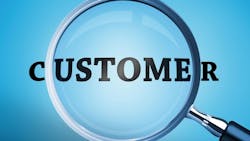Business have a lot of choices when it comes to who produces their components. Attracting and maintaining a loyal client base is clearly important, and there’s no easy way to accomplish that. In truth, it takes years to gain a thorough comprehension of your buyers and their individual preferences, which I’ve worked hard to obtain in my tenure as a rubber manufacturing executive. Ultimately, though, I’ve come to realize that everything I do for my customers stems from the same source: my desire to solve their problems.
When I was taking the first steps into my role at Midwest Rubber, I knew this company had to be different. I was frustrated with the de-personalization that appeared to be taking place in production in the manufacturing world. How could these plants possibly expect to meet their clients’ complex needs with a catalog of preset options? Setting myself apart from competitors and delivering the kind of service I wanted to provide was going to require a different model all together.
The Midwest Rubber Company was founded on the idea of fully customized solutions. We offer no standard parts – everything we create has been specially designed to fill a particular need that a customer brought to us.
Offering customization communicates something profound to your clients: that you care about them. I have found that many people came to my company not out of a demand for something exceptionally complicated, but because they felt that a previous manufacturer had failed to listen to or understand their needs. That’s why I always invite customers to play an integral part of the entire process by holding numerous discussions and working together on designs.
It’s true that there are additional challenges that come along with customization. Unlike a plant where the same parts and procedures are used again and again, accomplishing a custom project requires more time, brainpower, and commitment. Over time, though, these projects are opportunities to put your skills to the test. I know it sounds odd, but I genuinely enjoy it when a client approaches me with a difficult task or vague idea.
One unintended but welcome outcome that I partially credit to our business model is the closeness that has grown between my staff and me. My colleagues know that my reliance on them goes far beyond the basic necessities of labor – I look at each of my employees as a source of ingenuity and creativity. We truly do operate as a team. I’m fortunate to work with a lot of bright people, and it fascinates me to see what they can come up with and ways they can push our work further.
No matter the company, the goal remains the same: providing service that demonstrates understanding of your customers as unique entities. That’s something that can be accomplished regardless of what you’re selling, and it doesn’t always mean making sweeping change to the systems you already have in place. A little open-mindedness can go a long way.
Today, the Midwest Rubber Company works alongside leaders of many different industries, but I’d have to say that some of the creations I’m most proud of are those in the medical field. When people become dependent on assistance, it’s extremely important that technology continues evolving to meet their needs. And I don’t just mean computing and electronics – those of us who produce components must keep pushing ourselves, too. I would never be comfortable offering “one size fits all” answers to patients; I can assure you they certainly don’t see themselves that way.
If you’re interested in incorporating more customization options in your business, the easiest way to start is by looking at what’s not performing well, either internally or externally. What might be standing in the way of your clients having the best possible experience? In my view, when something is failing to work efficiently, it’s because there’s a person, component, or process whose needs are not being adequately addressed. Flexibility is often the answer. It’s not always pleasant or simple to change things if they’ve been done a certain way for years, but the goal is not to completely rid yourself of any old ideas – just to make room for new ones.
Ken Jehle is president and general manager at Midwest Rubber Company.
About the Author
Ken Jehle
President and General Manager
Ken Jehle is president and general manager at Midwest Rubber Company. As a visionary leader, Ken guides the talented team from management to the shop floor to achieve Midwest Rubber’s mission and accomplish their goals while remaining accountable to all stakeholders.
